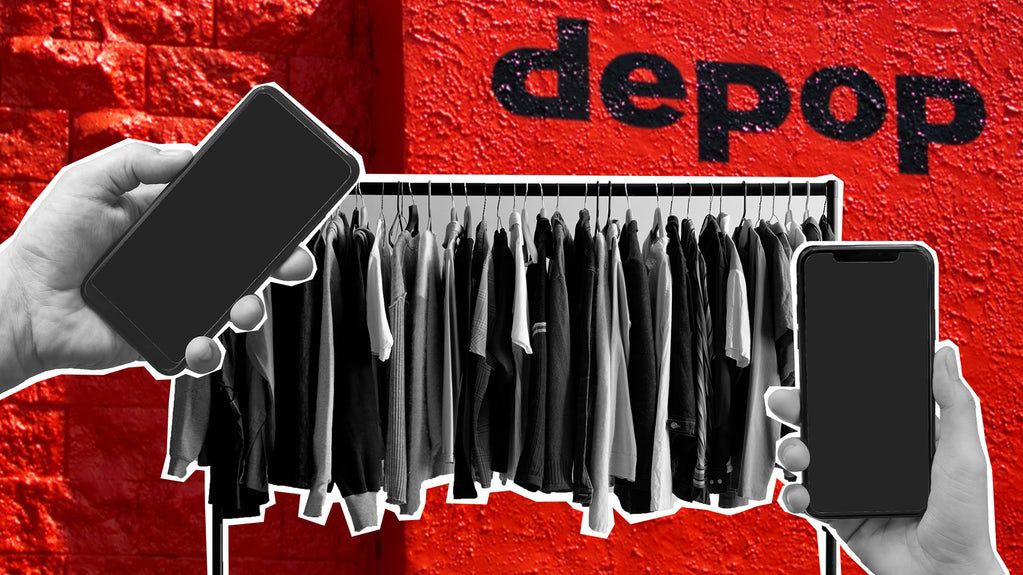Depop is a new innovative fashion platform with over 6 million members. Its success runs rampant on Twitter, having a staggering 152,000 followers, and its Facebook community reaches an extensive 68,000 likes. But the app is where it truly shines.

Depop is a mobile-controlled, fashion-led marketplace, which allows buyers to assist their independent visually authentic shop. One can say it’s similar to eBay, yet is also routing towards an inner Instagram; as it is more personalized, the focus is more aligned with the personality of the buyers and sellers. and the community that is formed. Give me facts: 300,000 items are sold every month. Feeling a bit better: There is a huge 150% year-on-year growth.
This app is at the moment headquartered in London with facilities in Milan and NYC and employing 80 people worldwide. Depop is the creation of Simon Beckerman, who co-founded PIG magazine in Italy in the early 2010s and initially forecasted Depop as solely a method by which readers would buy stuff they saw in the magazine. Additionally, he received loads of free stuff he wanted to unpack and engage within the artistic community at the same time.
This app features superb photographed photo-shoot images. Visuals are exclusively what you’ll see when you search – you are also forced to click on the image to get the information on the seller, price, item, and more!
Depop contains a huge membership containing over 6 million users. James Comyn, VP of product at Depop, mentions that this isn’t the first mobile cultured app for the young. However, 80% of users are between 16 and 24-years-of-age, and some of these people are tormenting a severe percentage of sales. Pocket money is not ideal. If it is plausible to efficiently sell people’s personality and lifestyle blog on Depop then they’ve attained it. As Comyns puts it: “We’ve created platforms for the taste to take over lives.”
Realated Contents:
how fake instagram followers hurt luxury fashion brands
fashion brands with a strong social media presence
the benefits of paid social media advertising for your business
How to run a fashion business on Depop
Does this mean it is possible for a 16-year-old to run a business on Depop? I can wholeheartedly say yes it is, and over time this has increasingly become the case. A strong social media profile is essential and a savvy teen can advocate that easily, so what starts off as selling off old T-shirts can quickly shift into a profitable line of vintage T-shirt collection and accelerated sell-on. Items sell over time and are always looking for the next elegant experience but it is also environmental because there is no new consumption – most items are second-hand.
It’s not about retail firms — it’s about people: you’re understanding it now. Create a fan base and a following, find the item, photograph with yourself wearing it, and then publish and sell. Work on your assets. Importantly, unlike certain sharing economy services such as AirBnB, the user community is not split between buyers and sellers. The majority of Depoppers will do both, resulting in a viral cycle of activity that users may track. In true social media fashion, you may simply like an item; you do not need to purchase anything; utterly commenting on it is sufficient.
So, does it function the same everywhere you go? The ranges, nevertheless, differ slightly. In Italy, for example, the focus is slightly wider – encouraged to develop – but in general, footwear and clothing are easier to send and continue to be the most widely mailed products. Users in the United States may obtain correct shipping labels; this will be available in the United Kingdom in due time. I doubt they need to conduct any marketing: you are absolutely correct. According to Comyn, growth was explosive in 2014-15, with all referrals coming through social media outlets. Hiring someone to conduct marketing — please excuse me while I choke.
What is the future of Depop? There is a trend toward focusing on the highest-rated people — 20% of the user base is responsible for 80% of the activity, regardless of whether they are mostly buyers or sellers. And, of course, brands have shown a lot of interest in the site.
Well, I was curious: ASOS utilized the site since it is so fantastic for social media, and many other firms are trying to figure out how to employ it since they notice that the young are less amenable to mass marketing.
What are they willing to try? Influencers are those who have a lot of power. Influencers, influencers, and more influencers. And it is to this end that Depop caters in the morning, noon, and night. That leads me nicely to…

Is that correct? #DepopFamous is a trending hashtag on social media. Someone who is not very well-known can nonetheless be a worldwide influencer, and businesses will go to great lengths to reach them through Depop. Let’s talk about money: Depop charges sellers a ten percent commission on the total item and delivery price, which Comyn feels makes the process more transparent for customers.
The final issue has to be if the majority of users are so young, what happens as these users become older? Depop is actually rather unconcerned about this. It does not anticipate users to return to the site if their interests and consumption habits change. Having stated that… Comyn claims he does not distinguish between users aged 16 and 60 and that once you have found your niche community on Depop, whether it be knitted cardigans or vintage trainers, then it’s pretty hard to leave.
You know, I’m thinking of selling my seasonal onesies: My friend, I can tell you right now — that is a community of one.
PCMS is a global provider of retail-specific IT software and services. PCMS delivers a comprehensive set of integrated commerce solutions across all selling contact points, as well as turnkey managed services and cloud hosting. Its clients include John Lewis, Marks & Spencer, Waitrose, Whole Foods, and Walgreens in the United States, as well as design companies such as Prada and Ferragamo in Europe.
Read More:

Peyman Khosravani is a global blockchain and digital transformation expert with a passion for marketing, futuristic ideas, analytics insights, startup businesses, and effective communications. He has extensive experience in blockchain and DeFi projects and is committed to using technology to bring justice and fairness to society and promote freedom. Peyman has worked with international organizations to improve digital transformation strategies and data-gathering strategies that help identify customer touchpoints and sources of data that tell the story of what is happening. With his expertise in blockchain, digital transformation, marketing, analytics insights, startup businesses, and effective communications, Peyman is dedicated to helping businesses succeed in the digital age. He believes that technology can be used as a tool for positive change in the world.











